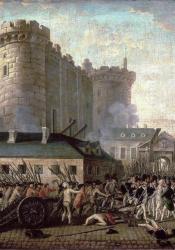The French Revolution
The French Revolution was a time of rebellion for many of France’s citizens. The monarchy was overturned and in place, a republic was built for the benefit and fairness of the people. Historians do not think it was a single event that started this Revolution, but there was some influence from the American Revolution that ended six years previously. The people of France were also fed up with their conditions and wanted a change. The poor were especially stricken by unbountiful harvests and the actions of the upper class, further pushing them into submission. The poor commoners eventually rose up and demanded rights. They eventually founded the Legislative Assembly, which was later called the National Convention (Wikipedia contributors). These groups fought the systems in place and were prominent during periods of time like The Reign of Terror. This period is known for the famous execution of Marie Antoinette. The guillotine, by which Antoinette was executed, was known to draw crowds for its public executions. By the end of the revolution, feudalism had been abolished and more power was given to the people through the establishment of republics and democracies (Wikipedia contributors). This war also inspired many events within it such as the Women’s March on Versailles. The French Revolutionary War led to people using their freedoms more than ever.
Ah, my dear friend Lucy, so brave, yet surrounded by loss. While I don’t know the girl personally, I wish to regard her as a friend because of her afflictions. In Charlotte Brontë’s newest novel, Villette, I can easily see the parallels between Lucy and the revolution not so long ago. She was a young woman born into loss, and while educated, she had to rise above so much that fate had given her. She as so much said to herself one night, “All at once my position rose on me like a ghost. Anomalous, desolate, almost blank of hope it stood. What was I doing here alone in great London? What should I do on the morrow? What prospects had I in life? What friends had I on, earth? Whence did I come? Whither should I go? What should I do?” (Brontë). Her grief and confusions were evident. At last, she fought the oppression-like system that has put her in such a poor position and fought to get a job for herself and make livable wages. In the Revolution, my family fought hard to rise up and get the rights they long deserved. When Antoinette was finally dead and gone, they rejoiced for freedom was now theirs. I know that once Lucy’s losses set in she felt great grief, but much like the poor commoners not so long ago, she gained the newfound freedom to start again and work for Madame Beck.
Brontë Charlotte. Villette. 1853, The COVE. https://studio.covecollective.org/documents/villette-2. Accessed 7 Sept 2020.
"File:Anonymous - Prise de la Bastille.jpg." Wikimedia Commons, the free media repository. 5 Jul 2020, 12:46 UTC. 7 Sep 2020, 19:03 <https://commons.wikimedia.org/w/index.php?title=File:Anonymous_-_Prise_de_la_Bastille.jpg&oldid=431053895>.
Wikipedia contributors. "French Revolution." Wikipedia, The Free Encyclopedia. Wikipedia, The Free Encyclopedia, 7 Sep. 2020. Web. 7 Sep. 2020.

